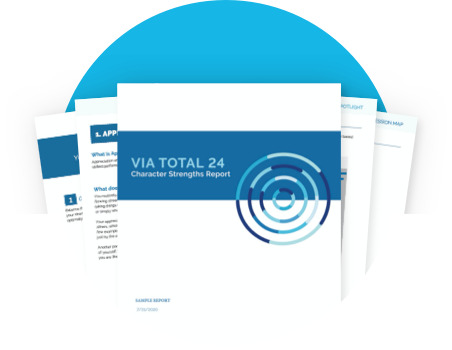Social anxiety has always been examined with a deficit-based approach- exclusively looking at what’s wrong or weak. Until now. Research shows how social anxiety can be linked to strengths expression, specifically overuse and underuse.
It is possible to overuse any of your character strengths. For example, if you use too much curiosity by asking your shy colleague one too many questions, they might start to view you as nosey and bothersome. Conversely, you can underuse your character strengths. For example, if you never give money to an important work charity, year after year, your colleagues might come to view you as low in generosity or underusing your strength of kindness.
Back to social anxiety disorder. How might the underuse and overuse of character strengths be operating here?
My colleagues, Pavel Freidlin and Hadassah Littman-Ovadia, and I investigated this question. We developed a test called Overuse, Underuse, Optimal-Use (OUOU) Survey of Strengths and gave it to people with and without a social anxiety disorder. While there were many interesting findings, one in particular stuck out to me. It turns out a unique combination of six overuses/underuses of strengths could be used to identify people with the disorder from those without (with over 87% accuracy!). This is the first actual study of character strength overuse/underuse to be published.
Here are the six overuses/underuses, along with an explanation of why they are relevant to social anxiety (they are not listed in any order of importance):
1.) Overuse of social intelligence
What it means: You are analyzing your thoughts and feelings too much. You might also be quick to over-analyze the intentions and actions of others.
How this relates to social anxiety: You are probably giving extra attention to your nervousness and worry and less attention to more balanced thoughts and other feelings (such as excitement, interest, and hope). For example, you might see a hand gesture or expression on someone’s face and come to an immediate conclusion that they are thinking something negative about you.
2.) Overuse of humility
What it means: You have little interest in talking about yourself or any of your accomplishments. When people praise you for doing something good, you feel uncomfortable and awkward and say little to nothing.
How this relates to social anxiety: Humility is an important strength and can have social benefits. However, too much humility in certain situations can lead to depriving others of learning about you. If people can’t learn about you, it’s hard for them to connect with you, which can subsequently contribute to sub-optimal social situations.
3.) Underuse of zest
What it means: If others perceive you as coming across without even a moderate amount of energy, you might be perceived as uninterested or lacking in enthusiasm. Zest is one of the character strengths most connected with happiness, so in some situations, you might even come across as “unhappy.”
How this relates to social anxiety: In order to contribute to social situations, you need to express energy. If you are bringing forth too little of energy, you won’t contribute as much. This underuse feeds your “avoidance” mechanism which is a problem because “avoidance of fear” is a hallmark feature of all types of anxiety. Socially anxious people avoid what they are afraid of, which further perpetuates the cycle of anxiety. Underuse of zest feeds this process.
4.) Underuse of humor
What it means: In some social situations, you are especially serious and don’t smile, joke, laugh, or see the lighter side of things. While that might be appropriate behavior at times, there are situations where humor is particularly important—take, for example, socializing with friends or co-workers at a restaurant.
How this relates to social anxiety: Socially, humor and playfulness are kings (or queens). People generally want to be around funny or playful people. They want to laugh and have a good time. If you underuse humor in social situations, you are essentially eliminating one of the main pathways to connecting and socializing with others.
5.) Underuse of social intelligence
What it means: You are not particularly attuned to your own feelings or the feelings of others. You pay little attention to social cues, body language, or the circumstances of the social situation you are in.
How this relates to social anxiety: Social situations often require a subtle and nuanced level of awareness of feelings and circumstance. People unaware of their own feelings, unable to speak appropriately to those feelings, unaware of how others might be feeling, or unaware of how to query and discuss others’ feelings are at a significant disadvantage. Furthermore, those who sense this reality within themselves are prone to feel more anxious about this disconnect. People with social anxiety may also misinterpret cues or misread body language, further contributing to the problem.
6.) Underuse of self-regulation
What it means: You have some difficulties in managing your reactions to others or in managing your feelings or personal habits. You may come across as lacking discipline (in your speech and behavior).
How this relates to social anxiety: The best social interactions involve a balanced back and forth of questioning, sharing, and communicating. If your self-regulation is particularly low in these situations, you may appear insensitive to others. This can impact the interaction and contribute to anxiety.
Taking Action:
- The first step is awareness. If you or someone you know suffers from social anxiety, what is it like for you (or for them) to look at anxiety in this way? The best course of action with this new research is to reflect on how you might be overusing or underusing these particular character strengths in social situations. This will lead you to new insights and ideas for taking action. VIA offers a personalized, in-depth Total 24 Report that provides more detail on overuse, underuse and optimal use of strengths.
- Think about social anxiety from the lens of overuse and underuse. This does not mean you have to get rid of deficit-based thinking or attending to symptoms and other parts that feel “wrong” about you. Instead, you now have an empowering language and a new lens for looking at this challenge.
Caveats:
There are different subtypes of social anxiety disorder that I have not addressed in this article. These are quite wide-range, for example, there are social fears involving eating in restaurants, giving presentations, and using public restrooms, to name a few. Thus, the overuse/underuse of these character strengths will need to be adapted accordingly.


